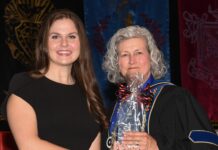Students in Charlotte Heatherly’s physical science class from Cullman Christian School recently visited the Wallace State Community College Diagnostic Medical Sonography program as part of their lessons on sound.
HANCEVILLE — Ninth and 10th graders in Charlotte Heatherly’s physical science class at Cullman Christian School received a lesson in how ultrasound technology is used as a diagnostic tool during a recent visit to the Wallace State Community College Diagnostic Medical Sonography program.
More than a dozen students heard from department head April Sutherland and clinical coordinator Donna Attaway as they reinforced lessons the students have learned during a unit on sound, and provided new information regarding ultrasound. Heatherly said she thought her students would benefit from being able to see how ultrasounds work and set up the visit to the program.
During their hour on campus, the students learned, among other things, about propagation speeds, the speed with which sounds travels through a medium; transducers, which change one form of energy to another; and the Doppler effect, how waves change frequency due to movement.
Students were able to see ultrasound in action when student volunteers let Sutherland and Attaway use ultrasound machines to examine the blood vessels in their neck, as well as their thyroid, trachea, and esophagus.
“It was really cool when she started laughing,” one student said of watching her classmate being examined and seeing the image of her throat contracting when she laughed and swallowed. Another student was struck by the ability to see the different arteries and learning how the gel on the transducer helped create a clearer image.
Heatherly thanked Sutherland and Attaway for taking the time to talk to the students about sound and the career options for sonographers.
“It’s very rewarding,” Attaway said of the career that helps diagnose medical issues so that they can be treated. “You will never be bored,” she added.
When asked by a student what sonographers most often exam in the field, Sutherland told them that legs, gallbladders and carotid arteries are the most common examinations performed in most hospital or general practice settings.
Wallace State’s Diagnostic Medical Sonogrpahy program is a four-semester program after the pre-requisite general required courses are completed. Applications for fall admission are accepted May 1 through June 1.
For more information about Wallace State and the Diagnostic Medical Sonography program, visit www.wallacestate.edu or contact Sutherland at 256-352-8318 or april.sutherland@wallacestate.edu.






























